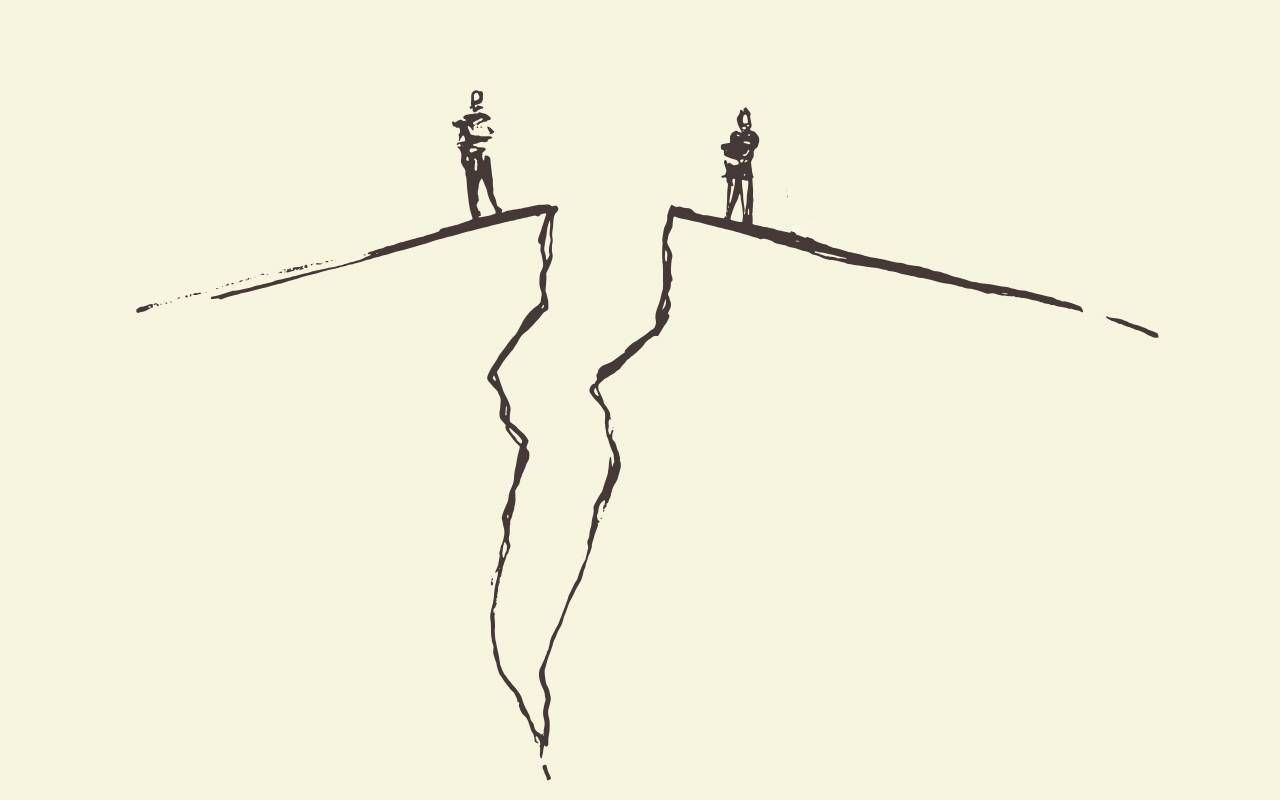How To Prevent Being Estranged From a Friend
Family estrangement is upsetting, but friend estrangement can be just as or even more distressing, especially as we get older
"The honeymoon was over," says Angie, 58.
Angie (not her real name) had recently moved to a new place and struck up a friendship. "You spend a lot of time together, you're on your best behavior, and then that best behavior goes away, and you see the other person for their true self," she says.

Her friend would demean and disparage her and expect Angie to do things without saying "please" or "thank you." Angie says, "Our friendship had gotten so close that now she was treating me like family, and she didn't treat her family very well."
Angie began to distance herself and considered ending the friendship.
The Beginning of Friendship Estrangement
Have you ever called or texted a friend, didn't get a response, and wondered, "Did I upset them? Are they mad about something?"
"Friendship is not easy. Friendship breakups happen. And not every friendship is meant to last you 80 years."
It's possible that the lack of response has nothing to do with you — your friend might be traveling, very busy or dealing with personal or health issues.
But sometimes it can mean the start of friend estrangement. Like family estrangement, friend estrangement is emotional distancing and the ending of communication.
Family estrangement is upsetting, but friend estrangement can be just as or even more distressing than family estrangement, especially as we get older. In fact, a study by Michigan State University showed that friendships have a much bigger influence on our physical and emotional state as we age than our family relationships.
Friendship May Not Be Forever
Even if you don't want to lose friendships, it's likely that you will part ways with some friends. Unlike family relationships, friendships are more fluid.
"Friendship is not easy. Friendship breakups happen. And not every friendship is meant to last you 80 years," says Lane Moore, author of "You Will Find Your People: How to Make Meaningful Friendships as an Adult." In fact, according to one study, you lose about half of your friendships every year.
Both men and women experience friendship breakups, which are common occurrences, says Dr. Avigail Lev, a psychotherapist and director of the Bay Area CBT Center.
As we get older, friendships change, too.
"As we age, we're more likely to lose friends since relationships often correspond to specific life stages," says Lev. "As we evolve, paths may diverge. However, it's also typical for friendships to rekindle after months or even years of estrangement. Relationships evolve and regress and friendships can transition through numerous phases."
"One friend makes a comment and the person receiving the information feels hurt. Even if the comment wasn't intended to cause upset, that's the impact the person receiving it felt."
Want some specifics? According to a 2021 study on friendship breakups in Evolutionary Behavioral Sciences, some common reasons friendships end include:
- Changing interests. This can happen when you switch jobs or no longer play a sport, and you have less in common with former coworkers or pickleball friends.
- Change in availability and/or geography. If you’re now a caretaker for your parent, you may have less time to spend with a friend; and if you move away, the friendship may naturally end.
- Different expectations. You may be looking for a friend to go out to eat and spend time with at the movies, while your friend may prefer long telephone calls with deep conversations.
- Broken promises and betrayal. An example, says Jackson Rainer, Ph.D., a clinical psychologist in Atlanta, Georgia, is if a friend shares a confidence and says this is very private and personal, and the other friend tells someone else.
- Selfishness. This can occur when you feel like a friendship is one-sided, where the other person dominates your interactions, takes more than they give, and you feel taken for granted.
Finally, friendship estrangement can be the result of one or a series of upsetting conversations, says Rainer. "One friend makes a comment and the person receiving the information feels hurt. Even if the comment wasn't intended to cause upset, that's the impact the person receiving it felt," he says.
What Friend Estrangement Looks Like
When a friendship cools, the person who wants out of the relationship may let you know that they don't want to continue the friendship, may suddenly be unavailable for get-togethers, or might even "ghost" you.
Ghosting is often associated with dating, but it happens with friendships, too. Ghosting is when one friend stops communicating with another friend, for an unknown reason. The ghosted person might find that calls aren't answered or returned, and emails and texts get no response.
Friendship ghosting is just as upsetting as romantic ghosting, according to a study published earlier this year. It found that people generally feel just as hurt after being ghosted by a friend as they do after being ghosted by someone they have dated.
What to Do If You're Estranged from a Friend
Not sure if a friend is ghosting you, or why you haven't gotten responses to calls or texts?
"Be prepared to hear something you might not agree with, don't remember saying, or that was taken in a way you didn't intend."
"You can always ask your friend if you've done something to upset them," says Rainer. There may be nothing wrong, and, again, your friend could just be really busy or traveling. It could also be something more serious.
"Be prepared to hear something you might not agree with, don't remember saying, or that was taken in a way you didn't intend," says Rainer. "It is your responsibility, as the person who made the comment, to rectify the situation, if you want to keep the friendship. That means you may need to apologize, be careful in your future word choices, or even look inside to see if there are ways you can be a more empathetic friend."
If you're having trouble working out your differences, and if your friend is open to it, you could even try friendship therapy, a relatively new idea where the two of you meet with a therapist to resolve friendship issues.
When to End a Friendship
While some friendships naturally end due to changes in life, others just don't feel good anymore.
If you're not feeling comfortable about a friendship, you might be wondering: when is it time to end the friendship? The answer, says Moore, is "as soon as you notice that you're not happy most of the time you spend with that person, if this person is constantly coming up in therapy, and/or if this is somebody who causes you more stress than providing you with relief."
Danielle Bayard Jackson, resident friendship expert for the Bumble For Friends app, host of The Friend Forward Podcast, and author of an upcoming book on friendship, has another suggestion.
"Take an aerial view of your friendship and see how much of it is positive and how much of it is negative. That should guide your decision."
"Research by The Gottman Institute finds that successful relationships have a positivity-to-negativity ratio of 5:1, meaning for every negative interaction you have, you'll need five positive interactions to outweigh that," she says."Take an aerial view of your friendship and see how much of it is positive and how much of it is negative. That should guide your decision."
Ultimately, says Bayard Jackson, "people might consciously decide to separate from a friend to protect themselves — emotionally, mentally, physically and psychologically."
In Angie's friendship situation mentioned above, Angie decided to talk to her friend before ending the friendship. "I told her we needed to address a hiccup in our relationship, and my friend said, 'Yeah, I noticed you were pulling away.'"
Angie explained her issues, including that her friend seemed distracted and not attentive when Angie was talking, which made it seem like she didn't care. Angie also felt that her friend wasn't flexible about doing things that were important to Angie.
Her friend was shocked, and told Angie, "I had no idea I was doing this. I am so sorry. I'm glad you brought it to my attention. I apologize, and I'll try not to do it again."
Angie has continued the friendship and is cautiously optimistic. "We're on round two of this friendship, and I'm wondering if my friend is really going to try to change, or if she can't change."
How to Break Up With a Friend
"The best way to handle ending a friendship is to be direct," says Bayard Jackson. "I know it's uncomfortable and they might be upset or disappointed, but research tells us ambivalent friendships have the potential to be even more physically detrimental than outwardly negative friendships."
"Research tells us ambivalent friendships have the potential to be even more physically detrimental than outwardly negative friendships."
"So if you feel strained by that relationship and you keep wavering, it may be best to say warmly and firmly: 'I've been thinking about this friendship lately, and I think I need to be intentional about being in spaces where I feel a little more [insert feeling], so I don't think I'll be able to keep this up the way I have been. And this is really hard and the last thing I want is for there to be tension between us, but I really do need to take a step back.'"
How to Prevent Estrangement By Being a Good Friend
We know how important it is to have friends, but what does it take to be a good friend?
A series of studies published in 2022 sheds some light on this.
According to the study, the top traits we want friends to have, in order of importance, were: honest, ethical, pleasant, available, discreet, tolerant, empathetic, fun, smart and alike. The most undesirable qualities were dishonesty, competitiveness and impatience.
In addition, women had higher expectations for friends and were more particular when choosing friends. The study also suggests that as we age, we may be more selective in our choice of friends.
Of course, we all have different wants and expectations for friendships. For one person, empathy might be the most important quality. Another might be all about having fun. And those qualities may change in importance as we move through different ages and life stages.
In fact, Moore suggests taking some time to make a list of what you think makes a good friendship.
Finally, to prevent hurtful comments that can lead to friend estrangement, consider this advice, attributed to radio host Bernard Meltzer:
"Before you speak ask yourself if what you are going to say is true, is kind, is necessary, is helpful. If the answer is no, maybe what you are about to say should be left unsaid."


